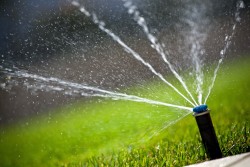Friday
Jul292022
Use Water Wisely
 General Landscape Corp. |
General Landscape Corp. |  Jul 29, 2022
Jul 29, 2022
 We have the flexibility to deliver next day service! Water is necessary for good plant growth. Overwatering saturates pore space in the soil depriving plant roots of much needed oxygen. Overwatering effects plants, wastes water, and costs you money.
We have the flexibility to deliver next day service! Water is necessary for good plant growth. Overwatering saturates pore space in the soil depriving plant roots of much needed oxygen. Overwatering effects plants, wastes water, and costs you money.
- Plant a shrub or tree in the proper enviromental conditions to minimize water use. Right plant, right place, right soil.
- Choose ground covers instead of lawn for hard to water areas, like steep slopes.
- Monitor your water bill to understand your water usage or to catch for leaks.
- Water during the cooler times, in the morning or later evening for more water absorption.
- Organic mulches retains moisture and saves water.
- Water for shorter periods if the water runs off easily.
- Put a spade in the soil off and on to see what mositure is in the ground.
- If there is moisture 2" below the ground, you have enough water for the plants.
- Hand water small areas of the lawn.
- Add compost to the soil to increase the water holding capacity and to add nutrients.
- More plants die from overwatering than underwatering.
- Aerate to reduce thatch in your lawns regularly to increase water absorption to the roots.
- Water infrequently, but deeply, to 6 inches.
- Take advantage of the morning dew in the fall months.
- Practice preventive plant health care from proper balancing of enviromental conditons, like water and nutrients.
- Reduce the watering to almost nothing on the north side of your property.
- Adjust your sprinklers so that you are just watering the plants and not your house or sidewalks.
- Less water goes deeper into the soil if there is no run-off.
- Overwatering increases the thatch layer in your lawn.
- Place plants that need a lot of water together to save time and water.
- Use plants native to New England. They need relatively little water once established.













Reader Comments